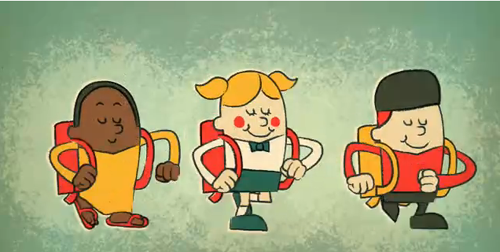
Image via: Invisible Elephant
Hey friends,
Japan’s earthquake and tsunami is a tragedy that deserves not only our financial and emotional support but it is also a wake up call for anyone living (or visiting) earthquake areas.  There is nothing scarier than thinking about what would happen to your loved ones if any sort of disaster hits–be it earthquake, fire, hurricane, or heavens knows what. But an ounce of prevention can help you sleep better at night and maybe just save you and your loved ones some grief. So, here is some information I pulled together over the weekend for my own needs that I hope can help you too.
1. Have a plan, Stan
The Red Cross recommends that families have two meeting places—one near where you live and one out of state.
Think about choosing an out-of-area emergency contact person. It may be easier to text or call long distance if local phone lines are overloaded or out of service. Â Everyone should have emergency contact information in writing or programmed into their cell phones.
Make sure you figure out the best route out of your home and practice getting out ASAP a few times a year. Know how to turn off your water and gas. Know whether or not it is safer to remain in your house or to get out. Â They say you have THREE SECONDS to react to an earthquake. That’s not much time. Â Make sure you know what you want to do. And the same goes for fires, hurricanes and everything else Mother Nature can throw at you.
There is a lot of information online about how to survive earthquakes in general. A lot of people are interested in the “triangle of life” that was mentioned in a recent TIME article. That same article also mentions that you should not stand in a doorway for safety during an earthquake. Who knew? FEMA has its own  recommendations of what to do in an earthquake. Just taking 10 minutes to update yourself on those facts can be a lifesaver.
2. Put together your emergency kit
Really, it’s not that hard—it’s just one of those things that is probably on your to do list and has been for awhile.  Plus, it is super easy to make your own emergency kit—you just need a free Saturday afternoon and a trip to your local Home Depot, Target or supermarket.
Here are some things you might want to add to your emergency kit:
- First aid kit
- Food: Â best to pack high protein foods that can last awhile. Â A jar of peanut butter, crackers, dried fruit, granola bars, canned tuna or chicken. Stay away from foods that need re-hydration or lots of water like beans or pasta. Â And remember to pack that can opener, friends!
- Water: It is best to put aside a gallon a day per person. You can store it in those two liter soda bottles.
- Invest in a good hand-crank radio and hand-crank flashlight.
- At least $100 cash.
- Copies of your birth certificates, insurance plans, drivers licenses.
- Copies of house and car keys.
- A back up favorite softie/toy/game for your kiddos.
Here are some great links to get you started:
- Build your own emergency disaster kit
- SF Chronicle’s disaster kit list
- Red Cross disaster kit list
- Child earthquake kit
You can also buy your own ready made pack at one of these places (and I’m sure more await with a quick Google search):
Don’t forget to make/purchase emergency kits for your car and for work too!
And remember to store it in easy access—not in the garage, basement or pantry.
3. Educate yourself and your family:
Natural disasters aren’t a death warrant. They can be survived with safety and aplomb.
Remember kids always seem to understand a lot more than we give them credit for, so letting them know that it will all be OK in the long run can really help them cope with it.  Kid’s Growth has a terrific post about that. And there are several resources available too to help them deal with any potential natural disaster nuttiness out there. Like the book, I’ll Know What To Do or FEMA’s Website for kids is another great resource.
LA City Mom wrote a quote from parenting expert Betsy Brown Braun, the author of, Just Tell Me What to Say, has some great advice.
She writes that the single most important message to convey is: “You are safe. I know how to keep you and our whole family safe. That is my job. We are all safe now, and we will continue to be safe.â€
Hopefully this little blog post will inspire someone to prepare for the next natural disaster near you.
What’s in your emergency kit? What’s the most surprising item? We are packing a deck of cards and some scotch! Seriously!
